
Sunday, October 30, 2011
U.S. Policy, Gadhafi and Libya
Excerpts from Minister Farrakhan's March 31, 2011 Press Conference
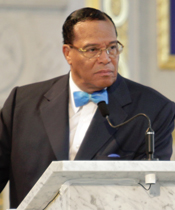 the Honorable Minister Louis Farrakhan |
In The Name of Allah, The Beneficent, The Merciful.
I love Muammar Gadhafi, and I love our president, Barack Obama. It grieves me to see my brother president set a policy that would remove this man not only from power, but from the Earth. That bothered me.
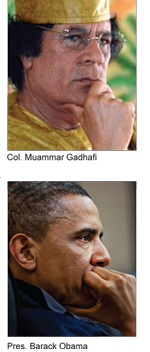 |
Now, I know why you are angry with him: Because he never agreed with your policies when it came to sucking the resources of Third World peoples, and putting in place dictators that would be amenable to America's policies. And whenever a government or leader arose, that wanted to use the resources of that nation for that nation's people, America, through the CIA, would plan insurrection, coups, terrorist activities and even assassination of good leaders to put in their place America's dictators!
How dare you, America, act like you're against dictators? When did America not love dictators? American people, I'm talking to you! We have researched the record of all the coups that have taken place since the 1950s to 1984: Your government is not clean! These are gangsters—but they wear suits; and they rob weak nations, and bring down strong ones!
Now some may say, “Farrakhan, you are anti-American!” Do you know the greatest Americans are those who will refuse to bend the Constitution for personal gain, party gain, and power gain? If there is such a thing in America as “freedom of speech,” then surely freedom of speech will allow America to hear her critics, and look at herself and make change.
The hypocrisy of America's ‘humanitarian concerns'
When sanctions came on Libya, Brother Muammar Gadhafi kept his nation going. These were very harsh sanctions; when we would go to visit, we couldn't fly, we had to go to Malta and take a boat, or we had to go to Djerba in Tunisia, and ride for 10 hours to Tripoli. His people suffered because he is a revolutionary.
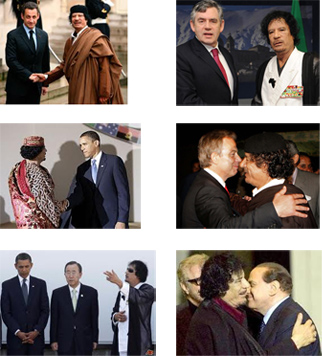 During Press Conference, images of Western leaders with Col. Gadhafi were displayed on video monitors. (CCW from left) France Pres. Nicolas Sarkozy, Former UK Prime Minister Gordon Brown, Former UK Prime Minister Tony Blair, Italy Pres. Silvio Berlusconi, UN Sec. General Ban Ki-moon, U.S. Pres. Barack Obama. I love Muammar Gadhafi, and I love our president, Barack Obama. It grieves me to see my brother president set a policy that would remove this man not only from power, but from the Earth. |
Did you know that with a government and a revolution like Brother Gadhafi's, you always have to have informants: People that listen to the people's talk against the so-called regime? As a result, there is going to be what? Repression. But when you have a government, and you're trying to keep your government going, can you stand for there to be a popular uprising with weapons? Fathers: If you've ever had your son push-up on you, did you “dialogue”?
The rebels in the eastern part of Libya are Muslims, and many of them, very good, sincere Muslims. Some of the scholars say there are more from the Wahhabi-Salafi strain of Muslims. And there's a study done that the Jihadists that were fighting in Afghanistan, many of the fierce ones came from eastern Libya. Now, when you see Muslims leaving their homes like The Mujahedeen, going to fight Russia in Afghanistan, they're not fighting about “money.” It's about a Cause worthy to spend your life.
In defense of Brother Gadhafi
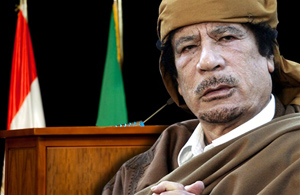 Libya was once the poorest nation on Earth, now, the standard of living in Libya is the finest in Africa; and the per capita income is double that of the Egyptians. So if the people have free education, free housing, free medical … how is that the work of a “lunatic,” and a “mad man”? |
Let me tell you what I know about this brother. He took power in a bloodless coup; he didn't kill anybody. My brother took the king out of power, and refused to live in his palace. And it's there in Tripoli today as a museum. He was a man from the desert. He chose to live in the desert.
At the time that he took power, America had a base there, Britain had a base there; they were in control of the oil. Gadhafi put the Americans out, put the British out, and nationalized the oil. Now wait! Is that a bad thing to do? I know the price of your gas is going up, but I'm talking about was that a bad thing for a leader of a nation to do, when the oil that's under their foot really belongs to the Libyan people? I read in the Book of John that Jesus was doing all these good works and he asked the people, “For which one of my good works do you stone me?” I want to look at some of the good things that I know of Brother Gadhafi.
He didn't want your democracy. He announced he was “Socialist.” That got him in trouble with the Muslim Brotherhood, that got him in trouble with the Wahhabis, and others, who are strict in their interpretation of the Qur'an. But Gadhafi started like Egypt's President Gamal Abdel Nasser, as a “Socialist.” When he came to power, all of a sudden the Libyan woman is educated, she's free. She's helping to build her nation. I don't know how many homes of American people have been foreclosed on, but it's in the millions! While we are losing homes, Gadhafi took the oil money and was building homes so that every Libyan has either a home or a flat that belongs to them. He built one hospital that I saw that was $500 million, with 18 operating theatres, and across from that they were making their own medicines. And he built another hospital, $500 million!
Libya was once the poorest nation on Earth, now, the standard of living in Libya is the finest in Africa; and the per capita income is double that of the Egyptians. So if the people have free education, free housing, free medical … how is that the work of a “lunatic,” and a “mad man”?
And I just read that in 2009, Brother Gadhafi said that he wanted to nationalize all the oil to get more money for the Libyan people. And guess who would be suffering? Western and European oil companies such as Anglo-Dutch Shell, British Petroleum, ExxonMobil, Hess Corp., Marathon Oil, Occidental Petroleum and ConocoPhillips, the Spanish Repsol, Germany's Wintershall, Austria's OMV, Norway's Statoil, Eni and Canada's Petro Canada. They could still get oil, but Brother Gadhafi would be in control of the fluctuation of production so he could keep prices at a reasonable rate.
But, my point is that I was in Libya, where I saw Gadhafi and his engineers: They found water in the desert. He brought water up from the desert, way out in Benghazi; and brought that water from Benghazi almost to the border of Tunisia. And I was one of those privileged to be there when the water started flowing. Gadhafi's hand, my hand, Ghana President Jerry Rawlings' hand, and another president—we hit the button together, and the water flowed.
Americans took all this Stimulus money to build infrastructure, but Gadhafi was building infrastructure. America's bridges are falling down! Americans can't get hospital treatment! In fact, the poor Brother President passed a medical healthcare bill, and the Republicans are about to destroy it! But not in Libya! Free health care. That's a “lunatic”?
He saw corruption in his popular committees, and he was about to disband the government and give direct money to the Libyan people in 2009! You know, when you start making changes like that, who do you anger? Your inner circle.
The last point: Brother Gadhafi wrote in “The Green Book” that the Black race would prevail in the world. And when the Arab League decided that they were going to let the West do to Iraq and Saddam what they did, he condemned them, and walked out. The Qur'an says, “Let not hatred of a people cause you to act unjustly.” Gadhafi is not loved by a lot of people, especially leaders. Now, there's some blame maybe on him; but you know, in God's Scale, He puts the good on The Scale with the evil, and the Qur'an says good outweighs evil.
Now when a man has done all of what Gadhafi has done for his country; he turns over his nuclear material and weapons of mass destruction, saran gas and mustard gas; and that man was so in tune with peace that even when the sanctions were lifted, he didn't spend money increasing the technology of his armaments, he was not prepared for what happened.
***
So my friends, my brothers, my sisters, since Brother Barack said that Brother Gadhafi has lost legitimacy to rule; and since the UN said “cease fire,” who was the ceasefire on? Was it just Gadhafi, or, not the combatants in the east? So if Gadhafi says, “I'll take the ceasefire,” but the combatants of the east say, “We want to go all the way to Tripoli and get rid of Gadhafi!” then the Qur'an says, “Fight with those who fight with you!” The Qur'an says when they betray you like this, seize them and slay them wherever you find them! That man wasn't going there to kill innocent people; he was killing the traitors! What the hell do you do, America, to your traitors?
So, in conclusion, I would ask America and the United Nations: Have a genuine ceasefire on both sides. If you really don't want humanitarian crisis, stop the fighting.
My warning to my brother president: Do you see all of the betrayals that are going on in Libya now? Well, I'm looking at us, because what's over there
Saturday, October 29, 2011
Wednesday, October 26, 2011
YOU GO BLACK WOMAN

It’s Official, There is Finally an All Female African-American Flight Crew. Afri...can-American women continue to demonstrate professionalism, intelligence and unlimited potential as they contribute to our overall struggle for unlimited freedom, access and opportunity in America. The sisters on Flights 5202 and 5106 (a jet owned by Atlantic Southeast Airlines) have proven that African-American women can do anything if just given a fair opportunity.
They made history on Thursday, February 12, 2009 as the first all African American female crew.Captain Rachelle Jones, and F irst Officer Stephanie Grant.See More
They made history on Thursday, February 12, 2009 as the first all African American female crew.Captain Rachelle Jones, and F irst Officer Stephanie Grant.See More
Tuesday, October 25, 2011
Monday, October 24, 2011
Sunday, October 23, 2011
Endangered Missing

| | |
| DOB: Apr 1, 2006 Missing: Oct 11, 2011 Height: 3'5" (104 cm) Eyes: Brown Race: Black | Age Now: 5 Sex: Female Weight: 55 lbs (25 kg) Hair: Black |
| Missing From: GLENDALE AZ United States | |
| Jhessye was last seen wearing a white t-shirt, blue jean shorts, and pink sandals. | |
 | ANYONE HAVING INFORMATION SHOULD CONTACT National Center for Missing & Exploited Children 1-800-843-5678 (1-800-THE-LOST) Glendale Police Department (Arizona) 1-623-930-4357 |
Saturday, October 22, 2011
Thursday, October 20, 2011
Gadhafi's death
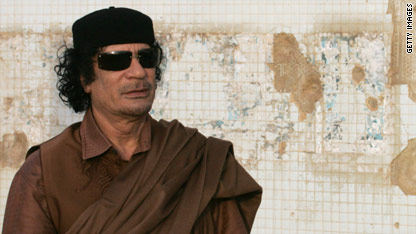
Tripoli, Libya (CNN) -- Libyans erupted in euphoria Thursday after longtime Libyan dictator Moammar Gadhafi was killed by revolutionary forces who were finally able to overrun his hometown of Sirte.
After weeks of fighting, troops from the country's transitional government attacked a house in Sirte where the deposed leader was hiding and shot him while he tried to flee, Information Minister Mahmoud Shammam told CNN. The streets of Tripoli echoed with celebratory gunfire, car horns and cheers as crowds ran or danced through the streets.
"This is a time to start a new Libya, with a new economy, with a new education and with a new health system -- with one future," Mahmoud Jibril, Libya's transitional prime minister, said after proclaiming Gadhafi's death.
Grainy video broadcast on Arabic satellite networks showed a blood-smeared but still-living Gadhafi, dressed in what appear to be military fatigues, being hauled onto a truck after his capture. Another video showed an apparently dead Gadhafi with what appears to be a head wound, but it was not clear what happened after his capture.
Gadhafi's body was taken to Misrata, said Mahmoud Al Nacoua, the Libyan ambassador to Britain.
"A black era has come to an end forever," the ambassador told reporters in London.
Gadhafi's killing caps an eight-month revolt and comes two months after rebels from the National Transitional Council overran his Tripoli compound and drove him from power. The mercurial former army officer, who seized power in a 1969 coup and had himself declared "king of kings" of Africa in 2008, was the third Arab leader ousted in the "Arab Spring" upheavals that began in neighboring Tunisia in January.
Abubaker Saad, who was a Gadhafi aide for nine years, said it didn't really matter whether Gadhafi was dead or alive -- as long as he was no longer a fugitive.
"As long as he was on the run, he represented a very ominous danger to the Libyan people," Saad told CNN. "He represented a very ominous danger ... to the idea of the democracy in Libya."
Also killed Thursday were Gadhafi's son Mutassim and the chief of intelligence, Abdullah al-Senussi, said Anees al Sharif, a spokesman for the National Transitional Council's military arm in Tripoli.
Fawaz Gerges, a professor of Middle Eastern politics at the London School of Economics, told CNN that Libyans still face a difficult political struggle. But he added, "We should not underestimate the significance of this day."
"Gadhafi was the head of the state, the most important symbol of the country. He repeatedly tried to rally his supporters to fight on," Gerges told CNN. "I hope that this particular day will not just mean the end of an era, but basically represent the beginning of a new era."
Gerges said the recent fighting around Sirte and another holdout of pro-Gadhafi loyalists, Bani Walid, exposed "some major tribal and regional cleavages" that Libyans will have to bridge in forming a new government. Those differences "could easily escalate, given the extent and the intensity of differences in Libya."
But he said Gadhafi's death sends a signal to other strongmen in the region: "If you oppress your people, if you don't engage your civil society, if you stay in power for so many years, this will be your end."
The confirmation of his death came after hours of conflicting reports as to the deposed leader's status. When those reports first reached U.S. Secretary of State Hillary Clinton during a visit to Afghanistan, she reacted with one word: "Wow."
Clinton said the end of Gadhafi would "add legitimacy and relief to the formation of a new government." And in a brief address from the White House, President Barack Obama praised Libyans for lifting "the dark shadow of tyranny" with the aid of Western air power.
"One year ago, the notion of a free Libya seemed impossible," Obama said. "But then the Libyan people rose up and demanded their rights. And when Gadhafi and his forces started going city to city, town by town, to brutalize men, women, and children, the world refused to stand idly by."
The NATO allies, spearheaded by Britain and France, backed up the revolt by bombarding pro-Gadhafi forces under a U.N. mandate to protect civilians. In a statement from his office, French President Nicolas Sarkozy said Gadhafi's ouster marks the start of "a new era ... one of reconciliation in unity and freedom."
And British Prime Minister David Cameron said Thursday "is a day to remember all of Colonel Gadhafi's victims," including the 270 dead in the bombing of a Pan Am flight over Lockerbie, Scotland, in 1988 and "the many, many Libyans who died at the hands of this brutal dictator and his regime."
NATO said it will convene for a meeting to discuss ending its operation in Libya, a senior NATO official told CNN. Earlier, NATO aircraft struck two pro-Gadhafi military vehicles in the vicinity of Sirte.
"It will be very soon, perhaps next day or two," the official said.
Adm. James Stavridis, supreme allied commander of NATO, is looking at "key pieces of intelligence" to make that recommendation. That will include assessing whether the revolutionary fighters control Sirte, which NATO believes they do, and whether Gadhafi loyalists can mount any significant counterstrike.
Gadhafi, wanted by the International Criminal Court in The Hague, Netherlands, for alleged crimes against humanity, had not been seen in public in months. World leaders sounded encouragement for a new Libya but cautioned that the road ahead will hardly be easy.
"In the coming days, we will witness scenes of celebration, as well as grief for those who lost so much," said United Nations Secretary-General Ban Ki-moon. "Yet let us recognize, immediately, that this is only the end of the beginning. The road ahead for Libya and its people will be difficult and full of challenges
Wednesday, October 19, 2011
Friday, October 14, 2011
Tuesday, October 11, 2011
Jurors view Michael Jackson autopsy photo
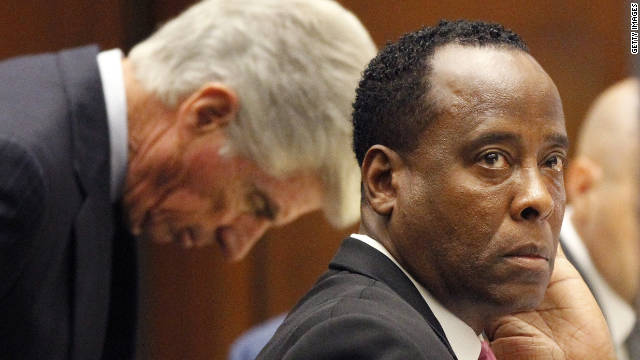 Tune in to HLN for full coverage and analysis of the Conrad Murray trial and watch live, as it happens, on CNN.com/live and CNN's mobile apps.
Tune in to HLN for full coverage and analysis of the Conrad Murray trial and watch live, as it happens, on CNN.com/live and CNN's mobile apps.Los Angeles (CNN) -- Michael Jackson's three children "cried and cried and cried" when an emergency room doctor told them their father was dead, Dr. Conrad Murray said in a police interview two days after the pop icon's death.
Jurors heard the last 45 minutes of the police interview Tuesdaymorning, the 10th day of Murray's involuntary manslaughter trial. Most of the audio recording was played in court Friday.
Perhaps the most disturbing moment came later when an overhead photo of Jackson's naked corpse on the autopsy table was displayed on a large screen in front of the jury. It was shown during testimony from the pathologist who ruled Jackson's death a homicide.
Jackson matriarch Katherine Jackson, who sat on the second row with daughter Rebbie Jackson for the first hour Tuesday, left the courtroom before the photograph was shown.
Dr. Christopher Rogers, who conducted the autopsy, said he ruled Jackson's death was a homicide because of Murray's reckless use of the surgical anesthetic propofol in Jackson's home to help him sleep.
"The risk outweighs the benefit," Rogers said.
He said it was possible that Murray gave Jackson an overdose, since he had no "precision dosing device" to keep Jackson asleep with propofol.
"Essentially, the doctor would be estimating how much propofol he would be giving," Rogers testified. "I think it would be easy under those circumstances for the doctor to estimate wrong and give too much propofol."
Rogers bolstered the prosecution contention that Murray used a makeshift IV setup to keep Jackson medicated and asleep.
The propofol bottle that prosecutors contend Murray used for the IV drip had a slit in the rubber top that appeared to have been made with a medical spike, not a syringe needle.
Murray could have pushed "a spike into the rubber stopper and then the propofol would flow out the end," Rogers said.
Rogers ruled out the possibility that Jackson self-administered the deadly dose of propofol during the two minutes Murray told police he was away from the singer's bedside.
Katherine Jackson was in court to hear Murray describe to detectives the reaction of her 11-year-old granddaughter, Paris, at the news that her father was dead.
"I will wake up in the morning, and I won't be able to see my daddy," Paris said, according to Murray.
Murray is not expected to testify during the trial, but the interview playback means jurors will have heard his story -- at least as he told it two days after Jackson's death.
 She was almost Michael Jackson's doctor
She was almost Michael Jackson's doctor Jackson friend: Murray should do time
Jackson friend: Murray should do time Conrad trial testimony debated
Conrad trial testimony debatedThe prosecution could benefit from the jury hearing Murray say he was away from Jackson for just two minutes before finding him without a pulse. Phone records and witnesses showed that moment came after he spent at least 45 minutes on his cell phone.
Murray's defense, however, may gain by the more personal view jurors get of the doctor without subjecting him to prosecution questioning.
The jury on Friday heard Murray's reasons for not immediately calling 911 for help, his explanation of his much-criticized CPR techniques, and his statement that he was trying to wean Jackson off a dependency on propofol.
Tuesday's interview playback began with Murray relating how Jackson's children "really were weeping, really weeping" when they were told doctors at Ronald Reagan UCLA Medical Center were unable to save their father.
"I hugged them all, gave comfort to Paris, comfort to Prince, comfort to Blanket, which is the last little guy, because whenever they were sick, they would always ask for Dr. Conrad," Murray said.
Murray, who treated Jackson and his children for colds and minor illnesses when they visited or lived in Las Vegas, was hired as Jackson's full-time physician just two months before his June 25, 2009, death.
"After they cried and cried and cried, then his daughter uttered a lot of words of unhappiness and, you know, she will live alone without her dad and she didn't want to be an orphan," Murray said, referring to Paris.
"She asked me, 'Dr. Murray, you said you save a lot of patients. You know, you save people with heart attacks, and you couldn't save my dad,'" he told detectives. "I said, 'I tried my best.' And she said, 'I know that, Dr. Murray. At least I know. I know you tried your best. I know you tried your best, but I'm really sad. You know, I will wake up in the morning, and I won't be able to see my daddy.'"
Murray said he also was unable to explain Jackson's death to other family members gathered in a conference room at the hospital.
"Do you know why he died?" one of them asked, Murray told police.
"My answer was 'No,' and that's the reason why I was recommending to the family to have an autopsy, because I also wanted to know," Murray said.
Prosecutors contend Jackson died because of Murray's criminal negligence, including the use of the surgical anesthetic propofol in his bedroom, without proper monitoring equipment.
The Los Angeles County coroner ruled that Jackson's death was the result of "acute propofol intoxication" in combination with several sedatives -- all drugs Murray acknowledged in the police interview that he gave Jackson in the hours before his death.
But in the portion of the interview to be heard Tuesday, Murray points the finger away from himself to other doctors.
"I was not aware of any other medications that he was taking, but I heard that he was seeing a Dr. Klein three times a week in Beverly Hills," Murray told police. "And he never disclosed that to me."
Defense lawyer Ed Chernoff contended at the start of the trial that Dr. Arnold Klein had addicted Jackson to Demerol, a narcotic pain reliever, during the singer's regular visits to his Beverly Hills dermatology clinic in the weeks before his death.
"His production team had said to me recently that his worst days in the set is when he had gone to Dr. Klein's office, which is about three times a week," Murray said in the interview. "And when he came back, he was basically wasted and required at least 24 hours for recovery."
Three earlier prosecution witnesses testified that they were aware of Jackson's frequent visits to Klein's office and that Jackson's speech would be slow and slurred afterward.
Toxicology tests did not find Demerol in Jackson's blood at the time of his death, but the defense contention is that it played a role because Jackson was unable to sleep because he was suffering from withdrawal from the drug.
Murray told police that Jackson was "showing signs of a withdrawal," but he suspected it was from propofol, which he said he was trying to wean Jackson off after two months of nightly use.
Jackson's death came after two nights of not using propofol. Murray said he gave him a series of three sedatives -- Valium, lorazepam and midazolam -- on the third night without getting him to sleep.
"It wasn't working," Murray said. "So, was he going through a withdrawal from that agent? Was it his mind that was forcing him to stay awake?"
After 10 hours of trying, Jackson begged him to give him propofol again, Murray said, which the singer called his "milk." He needed rest before an important rehearsal for his "This Is It" comeback shows.
"I've got to sleep, Dr. Conrad," Murray said Jackson pleaded to him. "I have these rehearsals to perform. I must be ready for the show in England. Tomorrow, I will have to cancel my performance, because you know I cannot function if I don't get to sleep."
By 10:40 a.m., Murray said, he gave in.
"I then decided to go ahead and give him some of the milk, so he could get a couple of hours sleep so that he could produce, because I cared about him," Murray said. "I did not want him to fail. I had no intentions of hurting him. And I was compassionate. But what I was doing, too, recognizing that Michael Jackson may have had a dependency to a substance. I was trying to wean him off."
On the recording, Murray insisted he kept a close watch on Jackson after he finally fell asleep. The physician never mentioned the long list of e-mails and calls that cell phone records later revealed.
The doctor said he left the room for about two minutes to visit the toilet. When he returned, he realized his patient had stopped breathing, Murray said.
"Immediately, I felt for a pulse and I was able to get a pulse in the femoral region," he said. "His body was warm. There was no change in color, so I assumed that everything happened quickly."
Murray told police he immediately started one-handed CPR on the bed alternately with mouth-to-mouth resuscitation on Jackson.
"I couldn't lift him off the bed by myself," Murray said. "What I did was to improvise. His bed is fairly firm, so I got my left hand under his body and I compressed with my hand not moving in place."
Jackson security chief Alberto Alvarez, the first person to join Murray in the effort, testified that he questioned Murray's knowledge of CPR techniques because he was trained to put a patient on a hard surface and use two hands.
Murray said he did not call 911 for help immediately because he expected answering the emergency operator's questions would take too much time away from the resuscitation efforts.
Instead, he ran down the stairs and shouted for the chef to summon help, and he placed a call to Jackson's personal assistant, Michael Amir Williams, to ask that he send a security guard upstairs, Murray said.
Murray said he tried his best to revive Jackson.
In the portion of the interview played Friday, Murray said Jackson told him that hiring him as his personal doctor was "divine guidance."
Murray said that when he agreed to be Jackson's personal physician for his "This Is It" shows in London, he had no idea he would have to give him regular infusions of propofol.
But it was a drug Jackson told him he had used for years to get elusive sleep, he said.
"I was a bit surprised of his pharmacological knowledge," Murray told police. "He explained that he used it frequently on his tours."
During his two months on the job, he gave Jackson propofol "30 days a month, every day, with the exception of three days leading up to his death," Murray said.
If convicted of involuntary manslaughter, Murray could spend four years in a California prison and lose his medical license.
10,000 finance jobs to vanish from Wall Street
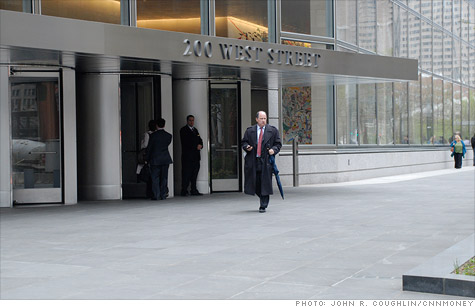 NEW YORK (CNNMoney) -- The New York state comptroller expects Wall Street to lose 10,000 jobs by the end of 2012.
NEW YORK (CNNMoney) -- The New York state comptroller expects Wall Street to lose 10,000 jobs by the end of 2012.The job losses are projected to occur in New York City's securities industry from now through December, 2012, according to Eric Sumberg, press spokesman for state comptroller Thomas DiNapoli.
"It now seems likely that profits will fall sharply, job losses will continue, and bonuses will be smaller than last year," DiNapoli said in a press release. "These developments will have a rippling effect through the economy and adversely impact state and city tax collections."
The comptroller blamed the dismal outlook on "uncertainty due to the European sovereign debt crisis, a sluggish domestic economy, volatile stock markets and regulatory changes."
The comptroller's office highlighted Wall Street's strong start for 2011, noting that the securities industry has weakened considerably through the rest of the year.
Wall Street added 9,900 jobs from January 2010 and April 2011, but then lost 4,100 jobs through August.
The comptroller's report said that "job losses are likely to continue given declines in profitability and recent layoff announcements," projecting that Wall Street job cuts could total 32,000 for the period from January 2008 to the end of next year.
The member firms of the New York Stock Exchange earned $9.3 billion in the first quarter, but profits "declined sharply" in the second quarter and are expected to fall short of $18 billion for the entire year.
Millions could lose unemployment benefits
Stock prices for Wall Street banks fell in Tuesday trading, in a seesaw reaction to Monday's rally and nervousness ahead of corporate earnings from the second quarter.
Shares of JPMorgan Chase (JPM, Fortune 500), Goldman Sachs (GS, Fortune 500), Bank of America (BAC, Fortune 500), Wells Fargo (WFC, Fortune 500) and Morgan Stanley (MS, Fortune 500) all fell by about 1%, and Citibank (C, Fortune 500) dropped 2%.
Nationwide, the U.S. added 103,000 jobs in September, which was stronger than expected, the federal government reported earlier this month.
But the economy has recovered only 2.1 million of the 8.6 million jobs lost since the recession began, keeping the unemployment rate frozen at 9.1%. 
Subscribe to:
Comments (Atom)
